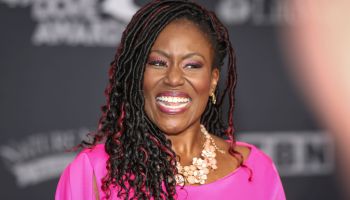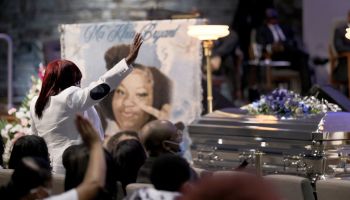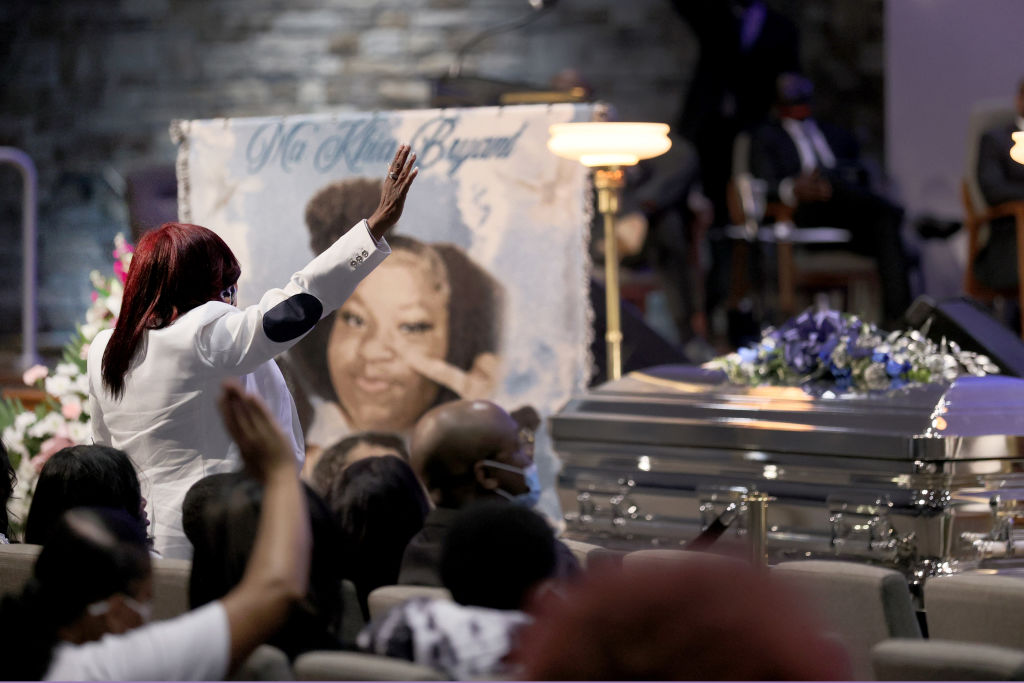
Source: Scott Olson / Getty
In America, Black children are betrayed all around, and too often uncared for until they are dead. The only time that Black people seem to collectively describe their children as precious is when they’re killed by white cops. Their funerals are a time when these young people are given the respect in death that they don’t always receive in life.
As people on both sides of America’s color line continued to debate whether she deserved to die, last Friday Ma’Khia Bryant was laid to rest at the First Church of God in Columbus, Ohio, surrounded by family, friends and people who didn’t know her. The 16-year-old honor-roll student was killed during a police-involved confrontation on the same day Derek Chauvin was convicted in Minneapolis for killing George Floyd.
A number of news outlets allowed viewers to watch the service live. The funerals of three other Black youth killed in recent weeks by police — Daunte Wright, 20, Adam Toledo, 13, and Anthony J. Thompson Jr., 17 — were also live-streamed and covered by media outlets, from Fox News to the BBC.
These funerals were yet more moments for the conspicuous consumption of Black death. Media outlets turned these young lives into public spectacle. In these moments, dead Black bodies became the fuel for career advancement, communal penance and the redemption of whiteness while offering a perverse synergy and sharp disconnect between the way Black communities treat their children while they’re alive and celebrate them once they’re dead.
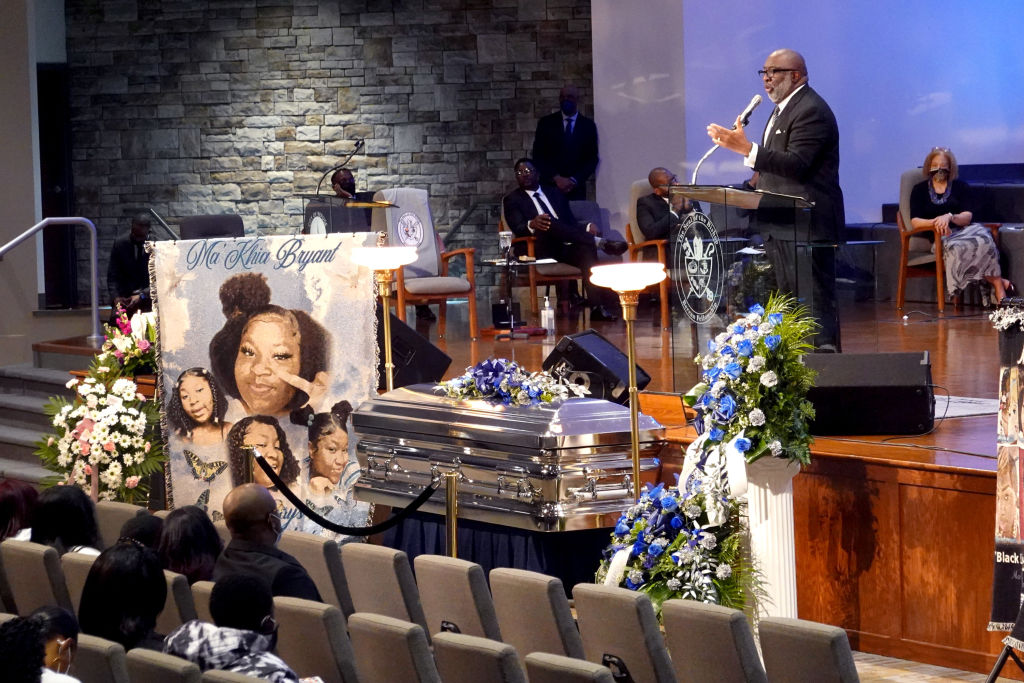
Bishop Timothy Clarke speaks at Ma’Khia Bryant’s funeral service. | Source: Scott Olson / Getty
Ma’Khia’s “homegoing” was filled with the usual pride and pageantry associated with the Black funeral tradition. A flower-filled altar provided a backdrop for her silver casket that was blanketed with blue roses on its lid. Members of her family wore large matching roses blooming from their shoulders. The organ’s sonorous chords filled the large sanctuary with Gospel music. And there was lots of passionate singing and hard talking about this young girl’s life punctuated by warmth and comfort of hugs to soothe the awful grief.
Bishop Timothy Joseph Clarke, who delivered MaKhia’s eulogy, began the service by welcoming news media and viewers watching behind computers and smartphones.
“So many news outlets and media venues have joined us. This is being carried not only in this state, this city and around the world, we interviewed with an outlet from Germany that said they’d be sharing throughout Europe,” Clarke said. “So this li’l girl has touched and shaken the world. Why don’t you give a great big round of applause for Ma’Khia. C’mon, I double-dog dare you to put your hands together and celebrate her.”
Bishop Clarke’s comments were beyond inappropriate — they were surreal. I couldn’t believe what I was hearing. As I watched this moment I said aloud to the screen, “If only she had been afforded this kind of care, respect and communal celebration while she was upright and breathing.”
But then I loosened the grimace on my face because I know that in my culture, funerals provide an opportunity for a community to show up and testify that the deceased person’s life mattered, no matter how that life was lived. With the cameras rolling, Ma’Khia’s family and community wanted the world to know that she had value and she was loved, even if they weren’t able to protect her from the daily pangs of foster care, systemic racism and a cop’s four bullets to the chest.
Sometimes pastors say the cringiest things during funerals. Clarke’s most grotesque moment came when he said, “She didn’t live long, but she lived well. And she made a difference.”
My bottom lip nearly hit my keyboard’s mouse pad. “She lived well.” How? “She made a difference.” How?
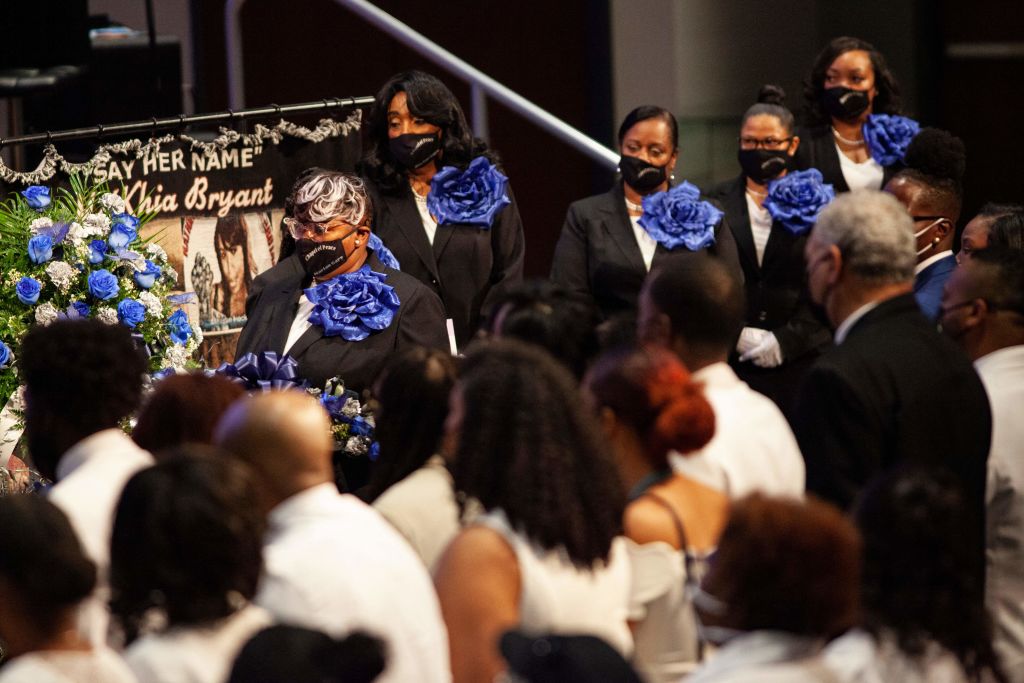
Source: STEPHEN ZENNER / Getty
Bishop Clarke’s comments had echoes of House Speaker Nancy Pelosi bizarrely placing her hand over her heart and thanking George Floyd for sacrificing his life for justice following the conviction of Derek Chauvin. These deeply problematic voices in positions of leadership and authority usually push the white supremacist party lines that normalize police cutting Black lives down and portraying the victims as noble martyrs whose deaths served the greater good.
Did Bishop Clarke forget that Ma’Khia was in the custody of a racist foster care system at the time of her death? We still don’t know why she was placed in care but obviously, she had experienced some kind of abuse or neglect in her family of origin. We know from her biological sister that there was violence and trauma happening in that placement. How can a preacher fix his lips to say that a child whose last act was to wield a knife in defense of herself was living well before her death?
Bishop Clarke seemed excited to announce that Jamal Bryant, the charismatic, politically connected pastor of New Birth Missionary Baptist Church in Georgia, had flown all the way from Atlanta to speak at the funeral. Pastor Bryant, who was run out of Baltimore a few years ago, has been accused of sexual misconduct and extramarital affairs and was filmed saying, “these hos ain’t loyal,” referring to women he deemed promiscuous.
Pastor Bryant also acknowledged the media in the sanctuary and noted that the dead teen’s parents were “standing with dignity and class.” He repeatedly referred to Ma’Khia as a “baby” who needed to be sent home with honor and dignity.
“Today she should have been thinking about SATs, thinking about the prom, thinking about going to Central (State University) or Wilberforce or to Spelman or to Howard,” the pastor said said. “The reality is we can’t sugarcoat the fact we shouldn’t be here today.”
He is correct — the girl should be alive, not being mourned. But the dynamic of Black people struggling through this onslaught of racist terrorism, kept alive by fresh grief and loss, is rooted in 400-plus years of Black pain, trauma and death.
Black people and funerals are always spectacles. It’s communal. We have big funerals, open caskets, sing 8,000 songs, say all kinds of things about these people that we never said in person. We dance. We drink. We eat. We commune and send off the dead with platitudes about them being in a better place and liberated from this racist hellscape. But when pastors show out for the media, we often have to ask whether they actually care about the murdered child.
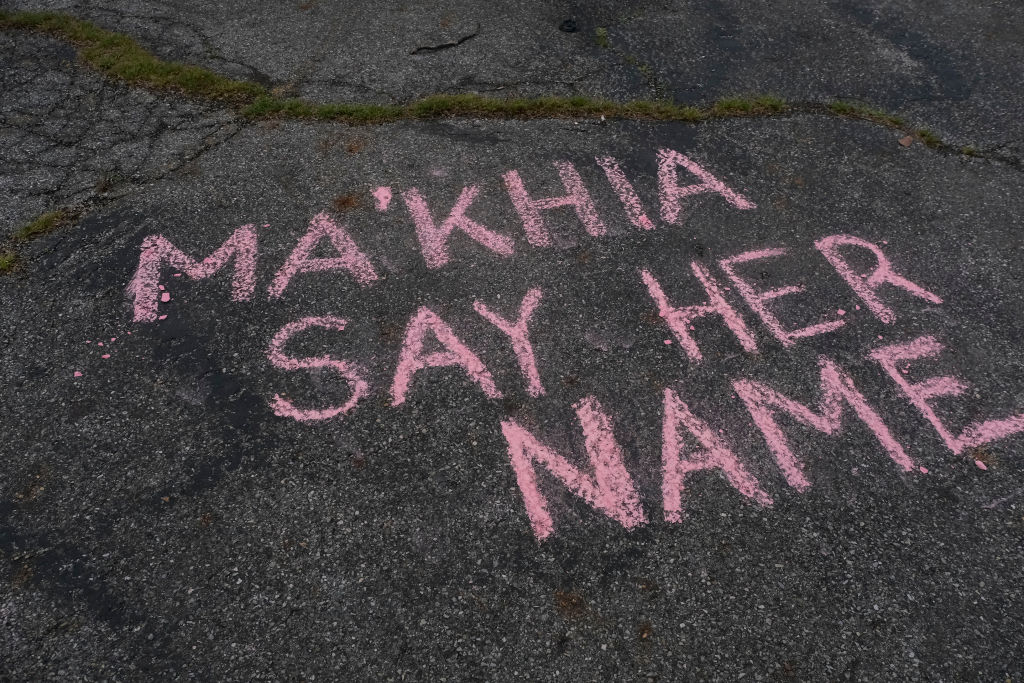
Source: JEFF DEAN / Getty
When the victim is a child, the people at the mic change the tenor of the messages. Some are charlatans performing for the cameras. Sometimes white people show up to create a different kind of spectacle — one that centers and flatters them to assuage their guilt and complicity with systemic racism that produces Black death. The white people showing up and the presence of the news cameras make people change the way they celebrate a life.
The mission should be to celebrate children and say something meaningful about a life cut too short. Instead, these live-streamed funerals are part of the choreography of state murders and modern day lynchings of Black bodies. What Ma’Khia needed — what she deserved — was dignity and people who cared about her and valued her as much in life as in death.
And she deserved to be eulogized in the proper context, not talked about like she was a violent grown woman attacking another woman with a knife for no reason. She was a 16-year-old girl who deserved to live, not be shot like a dog in the street. Her family should have able to grieve her privately, not served up for public consumption.
White America loves the spectacle of Black death. The performance-driven live streams are reminiscent of lynchings where white people collected the body parts of victims — clumps of hair, teeth, fingers, toes, charred flesh, bones, and genitals — as souvenirs, keepsakes, and objects of fetish. The spectators viewed lynchings as celebrations to reaffirm their privilege and status in society, the symbolic power to contain a Black “threat.” And then they showed up to our funerals to ensure there was no talk of retribution or pursuit of justice.
I don’t know why Black folks keep allowing this digital gaze into our sanctuaries as we bury our dead. The sight of Black death will not compel white outrage and elicit sympathy to produce action. We know all too well that knowledge of, exposure to, and confrontations with racism has not inspired action or led to transformation.
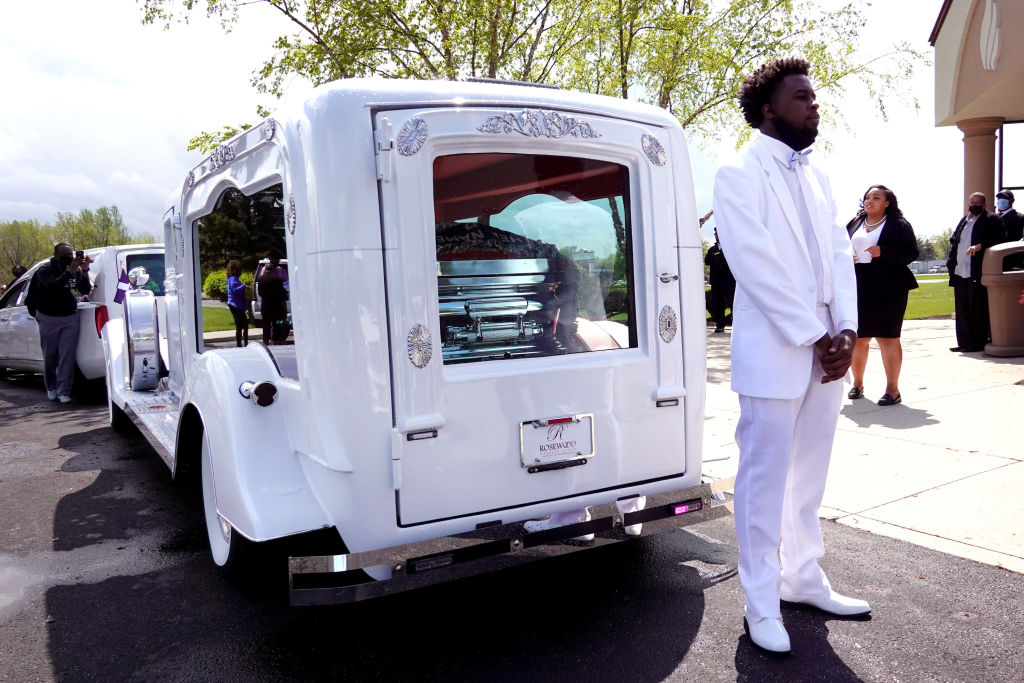
Ma’Khia Bryant’s brother, Khalil Bryant, is shown following her funeral. | Source: Scott Olson / Getty
MaKhia’s funeral was a call to protect Black girls, even as she was trying to protect herself from Black women.
“Ask yourselves, ‘What are you doing to make sure no more Ma’Khias are taken from us?’ What are you doing?” Pastor Bryant asked. “Are we just talking about it or are we doing something about it. Doing nothing is not an option.”
Beyond spectacle, her funeral was also a call to action for law enforcement to stop killing Black people in encounters that have become so regular that they are now known by the victims’ names. In his eulogy, Bishop Clarke urged the culture of policing to change to avoid more services like the one Friday.
“We’ll get Ma’Khia back when police training changes. We’ll get Ma’Khia back when White officers don’t see Black skin as a threat to them,” Clarke said. “We’ll get Ma’Khia back when we learn how to de-escalate and talk and communicate. We’ll get Ma’Khia back when we value one another and respect one another.”
I had hoped that Clarke’s eulogy would include a call for Black communities to have some hard conversations about Black parenting practices that result in far too many of our children being placed into foster care. To have a conversation about so much anger and violence among traumatized youth. And to talk about the nearly 400 black children who are killed each year as a result of maltreatment by their own parents and caretakers.
SEE ALSO:
There Is No Country For Black Girls Like Ma’Khia Bryant
How To Support Black Youth In The Aftermath Of The Chauvin Verdict And Ma’Khia Bryant‘s Killing
Ma’Khia Bryant And How Funerals For Young Black Lives Have Become Public Spectacle was originally published on newsone.com








